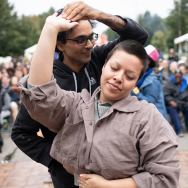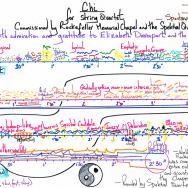The University of Chicago will celebrate Erich Wolfgang Korngold’s music over the course of a 10-day festival—one that will examine how his life and work show a transformational change from composing late-romanticism in classical music in Vienna, to Hollywood film music in Los Angeles.
Starting April 1, Korngold Rediscovered will host a variety of events at UChicago’s Reva and David Logan Center for the Arts, including musical performances, a symposium of lectures and panels, the American premiere of Korngold’s final opera and a film screening. The festival will conclude April 10 with a performance by the French string quartet Quatuor Diotima, which will play music by Korngold and other composers.
Ticket prices vary depending on each specific event. The festival is a collaboration between the Chicago production company Folks Operetta and the University of Chicago, including UChicago Presents and the Division of the Humanities.

Behind the scenes, Prof. Philip V. Bohlman was pivotal in planning this complex event. He also shares the limelight as the artistic director of the New Budapest Orpheum Society performance on April 6.
“Korngold was a very talented composer who could create songs, operas and concertos starting at the age of 11, but he was not considered a genius in Vienna,” said Bohlman, the Ludwig Rosenberger Distinguished Service Professor in the Department of Music at UChicago. “Like Joseph Haydn, Korngold was groomed to be a musician from his earliest years. The most fascinating part of his life and work is how he makes the transition to America and to Hollywood film music.”
The Korngold Festival looks at the big picture of this historical time and how to reconsider the relationship between Korngold’s pre-film versus film compositions. For example, Bohlman thinks the performance of Korngold’s forgotten opera, Die Kathrin, on April 7 and 9 is significant because it marks the end of a music tradition. After writing the opera, Korngold transitioned to composing film scores like the Academy-Award winning music for The Adventures of Robin Hood, shown on April 8.
In this edited Q&A, Bohlman discusses how Korngold’s work and life fit into and define the complicated period after the end of World War I through the turmoil of World War II and into the Cold War.
When did you become intrigued with the music of Erich Wolfgang Korngold?
During my extensive research on Jewish music and exiles from Europe to the U.S., I learned about Korngold. I became interested in him because Korngold was so different from other modern composers. After starting as a late-romantic composer in Vienna, he found his way into a Hollywood sound.
In fact, Korngold underwent a sea change in his style. His transition from composing operas and concerts to film music was rapid. His opera Die Kathrin stands on one side and his Academy Award-winning music for The Adventures of Robin Hood on the other side. Once Korngold made the transition, however, he couldn’t find his way back to composing operas and songs again. For example, his most famous U.S. composition, the Violin Concerto, reflects the sound of his Hollywood films.
How would you define the Golden Age of Jewish film music? How does Korngold fit into this era?
The Golden Age of Jewish film music started with the first talking picture, The Jazz Singer, in 1929 because it combined synchronized sound with cinema. The star of that movie, Al Jolson, plays a Jewish cantor’s son, and the film depicted Jewish life in immigrant New York City. Talking pictures created the opportunity for music to shine. Many of the composers were Jewish—either exiles from Europe or immigrants.
As an exile and later U.S. citizen, Korngold canonized a certain style in Hollywood movies. His music transforms the role of music in film. Today when we hear film scores that Korngold created, we think that we have heard them before. A current film composer, John Williams, carries on the music tradition in the Star Wars and Harry Potter movies, for example, which Korngold and his contemporaries developed.
“There’s a tremendous amount of good music to experience.”
How did Korngold’s music for The Adventures of Robin Hood and several other successful Hollywood movies change the importance of music in cinema?
His style of music was a major change from earlier films, creating a different structure. For example, in The Blue Angel (1930, German version), the characters speak and then they sing like musical theater. In contrast, Korngold’s music is present from beginning to end of movie. He composes a film score throughout for movies, not individual songs. This transition for film music starts in the 1930s as the big movie studios were evolving. In less than a decade, movies made the change from separate music to synchronized music. Korngold was one of the first composers successfully creating this new style to fit the Hollywood film.
What can visitors look forward to in this festival?
There’s a tremendous amount of good music to experience, and music is important to us. Together these events in the Korngold Festival allow us to understand the historical sweep of one of the most complicated periods of history, from end of World War I to World War II into the Cold War. The Korngold Festival gives us both musical performances from this time and scholars analyzing what was happening in the Symposium held from April 6 to 8. This provides attendees with new dimensions to the art, music and cinema of this pivotal time.
For more information on performances, the symposium and registration, visit the Korngold Festival website.
—This story was first published by the Division of the Humanities.









